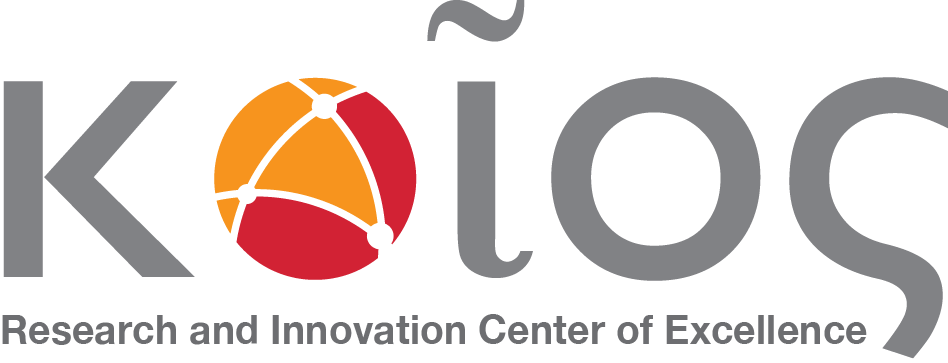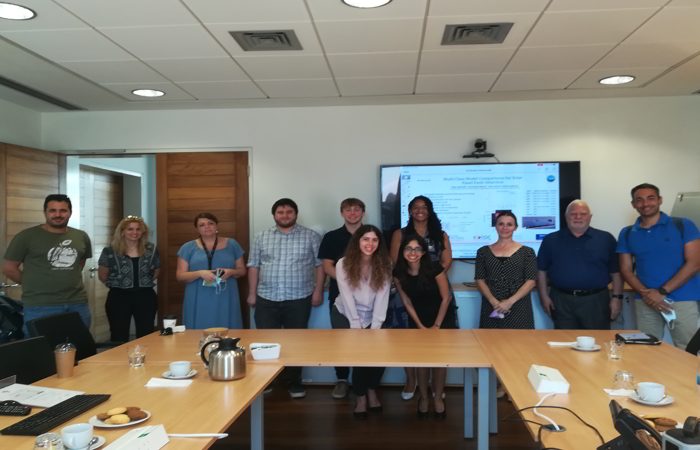This summer, four undergraduate students from the Sensor Signal and Information Processing Center (SenSIP) at the Arizona State University (ASU) participated in collaborative research on machine learning for solar energy systems at the KIOS Research and Innovation Center of Excellence (KIOS CoE) at the University of Cyprus (UCY).
This research endeavor, between ASU and UCY, has been running successfully for 3 years and is supported by the National Science Foundation’s International Research Experiences for Students (IRES) program. This program focuses on active research participation by undergraduate or graduate science and engineering students in high-quality international research, education, and professional development experiences.
The students participating in the program, Trevor Irvin, Niki Kyriacou, Kaden McGuffie, and Sanika Naik along with Professor Andreas Spanias spent four weeks at the KIOS CoE, alongside faculty and researchers. Through their placement they gained valuable research experiences, broadened their perspectives, and developed their professional skills.
Motivation for participating in the program
Students decided to apply to this program because they wanted to conduct research-related activities beyond geographical boundaries and interact with researchers in another cultural environment.
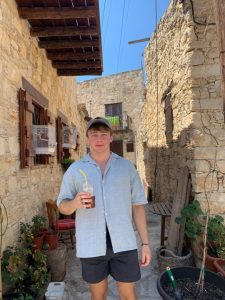 Kaden McGuffie, an undergraduate student in Electrical Engineering said that he applied to the IRES program for a multitude of reasons. “The main motivators for me to apply was the program applications with machine learning, the international experience, and the research experience. Working on a program where I could learn how to code machine learning algorithms, while learning the research process in a foreign country was the best program for me”.
Kaden McGuffie, an undergraduate student in Electrical Engineering said that he applied to the IRES program for a multitude of reasons. “The main motivators for me to apply was the program applications with machine learning, the international experience, and the research experience. Working on a program where I could learn how to code machine learning algorithms, while learning the research process in a foreign country was the best program for me”.
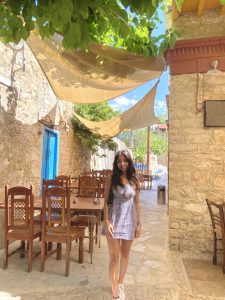 Sanika Naik, an undergraduate student in Computer Systems, added: “I decided to join this program because I wanted to explore the field of engineering and machine learning, specifically in a hands-on environment. I was also unfamiliar with research and the ways it is conducted in other countries, and this was something that I wanted to learn more about”.
Sanika Naik, an undergraduate student in Computer Systems, added: “I decided to join this program because I wanted to explore the field of engineering and machine learning, specifically in a hands-on environment. I was also unfamiliar with research and the ways it is conducted in other countries, and this was something that I wanted to learn more about”.
International research experiences
This collaborative IRES project promotes international multidisciplinary research at the overlap of sustainability, power systems and signal processing, aiming to improve efficiency in photovoltaic power generation. Students were trained in machine learning, vision, and data processing for energy systems. . In addition to participating in machine learning for solar energy systems, all the students received training in quantum computing. More specifically, students also produced quantum machine learning implementations of solar panel fault detection and created IRES reports which will be transmitted to NSF. All the students were co-mentored by ASU SenSIP and UCY KIOS mentors. The engineering mentorship teams consisted of Glen Uehara and Andreas Spanias (from ASU SenSIP), and Lenos Hadjidemetriou, Maria Michael, Christos Laoudias and Charis Theocharides (from UCY KIOS). Stella Hadjistassou on behalf of KIOS provided lectures on cultural and language experiences in Cyprus.
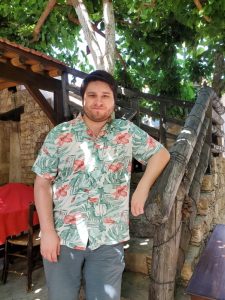 Trevor Irvin, an undergraduate student in Computer Science mentioned: “I learned about machine learning, quantum computing, and cyber security which has presented many possibilities for specializing later in my academic career. In this program, I learned how to write an IEEE-style research paper which I’ve never done before. I also learned a lot about how to present my research.”
Trevor Irvin, an undergraduate student in Computer Science mentioned: “I learned about machine learning, quantum computing, and cyber security which has presented many possibilities for specializing later in my academic career. In this program, I learned how to write an IEEE-style research paper which I’ve never done before. I also learned a lot about how to present my research.”
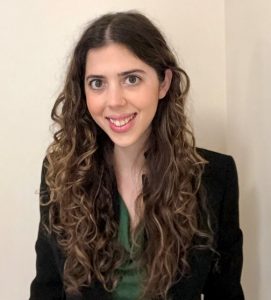 Niki Kyriacou, a student in the Physics Department, said: “I improved my research skills by learning how to consider the entire system in relation to each individual piece. For example, in my project about wind power, it was important to understand the wind turbine’s cut-in and cut-out speeds to select the most relevant data to train the model to predict power generation from wind speed”. Niki co-authored a publication on quantum machine learning with ASU colleagues which will be presented next October in an IEEE Conference.
Niki Kyriacou, a student in the Physics Department, said: “I improved my research skills by learning how to consider the entire system in relation to each individual piece. For example, in my project about wind power, it was important to understand the wind turbine’s cut-in and cut-out speeds to select the most relevant data to train the model to predict power generation from wind speed”. Niki co-authored a publication on quantum machine learning with ASU colleagues which will be presented next October in an IEEE Conference.
Through this research experience, Kaden was able to develop his problem-solving skills. He mentioned: “There are many roadblocks, especially with coding, when trying to find solutions to the given project. Researchers must be able to continue to learn and know how to apply their knowledge. In college, I spend most of the time learning techniques and solving problems with definite answers. This project was a mind opener for me enabling me to see that in the real-world solving problems requires a different approach.”
Cultural experiences in Cyprus
During their stay in Cyprus, students visited many coastal cities and various villages at the Troodos mountains. They also had the opportunity to taste traditional Cyprus food!
Trevor said that he enjoyed very much his stay in Cyprus: “I got to visit many of the coastal cities and their breath-taking beaches. I toured the Troodos mountains and got to see the beautiful waterfalls and greenery. I also got to sample a lot of delicious food in Nicosia. My trip highlights were cliff-jumping in Ayia Napa and having a meat meze for the first time with my ASU colleagues. This was my first international travel experience, and it didn’t disappoint me”, he said.
Finally, Sanika added: “I loved my stay in Cyprus and its diverse culture. My favorite part was the trip we took to the Troodos mountains and being able to explore the culture of the various villages there”.
The students also visited the University of Cyprus Library and met with the Rector, Prof. Tasos Christofides, who referred to the research collaboration opportunities between the two Universities. In addition, they also met with education and public relations officials from the U.S. Embassy in Cyprus.
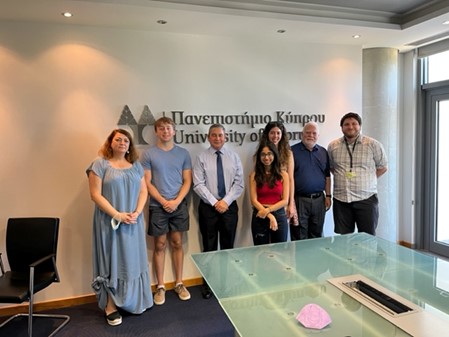
These cross-cultural experiences along with the research experiences supported by the IRES program can benefit students and researchers personally and professionally, as they learn the importance of international collaboration in addressing global research challenges in science and technology.
All the IRES students presented their research at the 2022 UCY CWSPI workshop which was held at the UCY library on July 13, 2022.
The IRES program is funded by NSF award 1854273.
